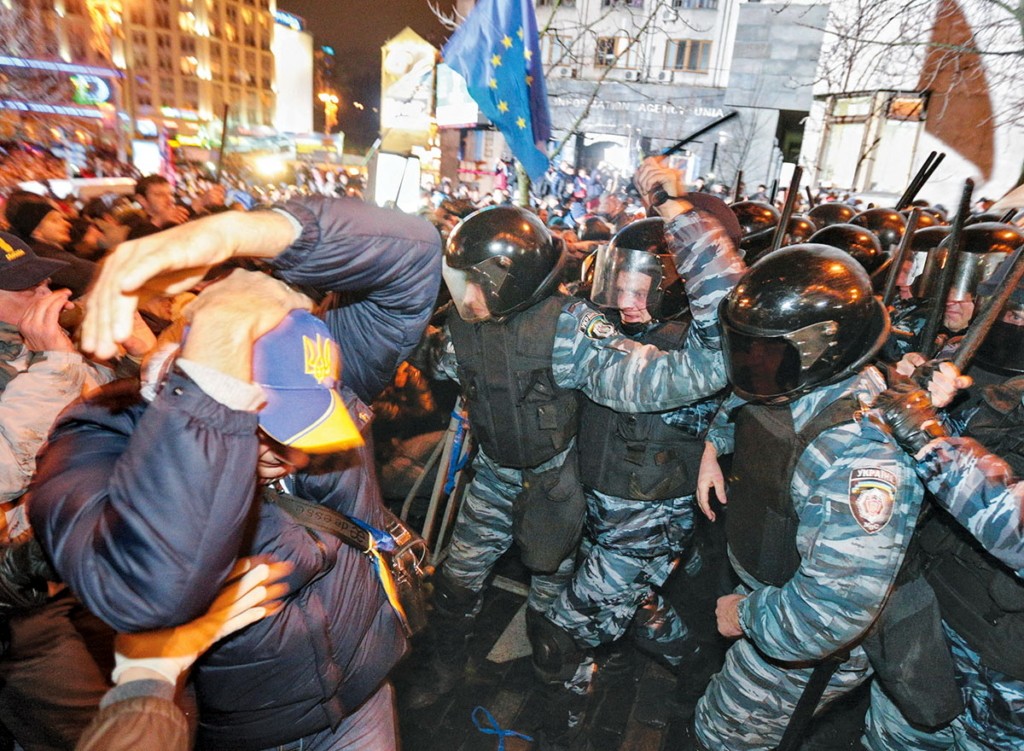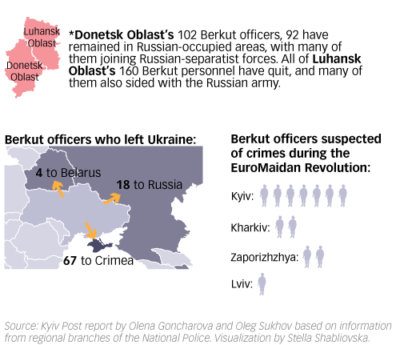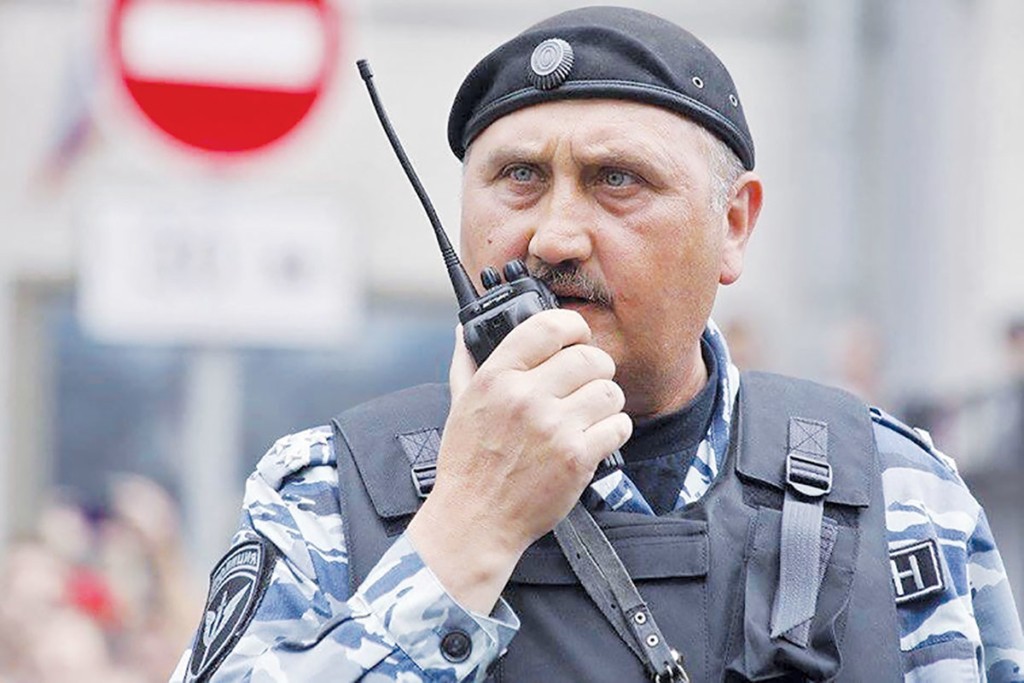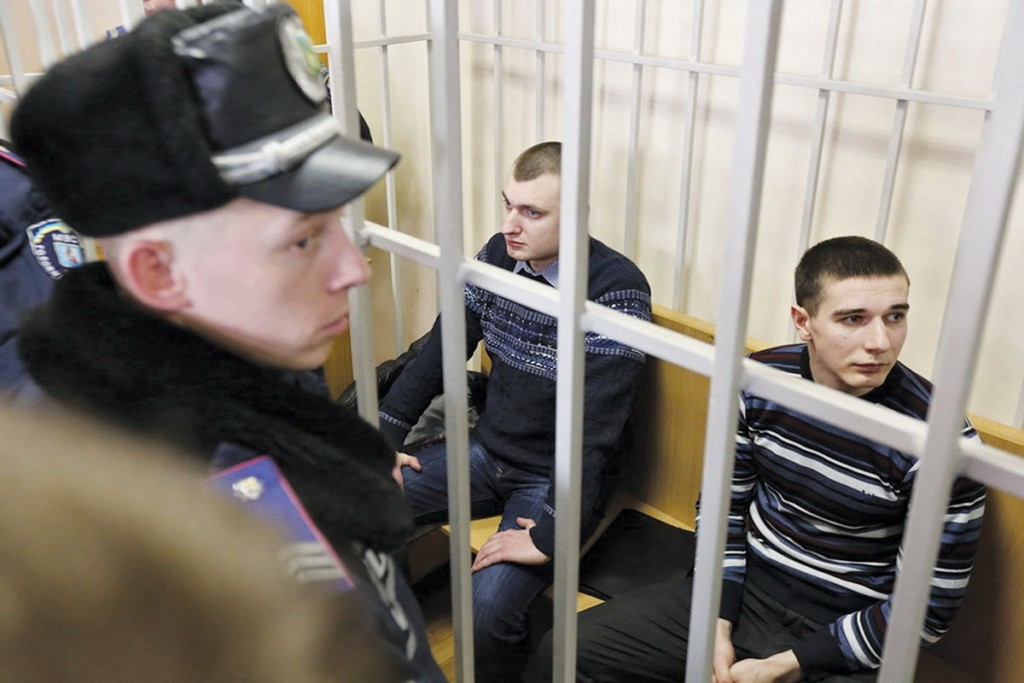The Berkut riot police, former President Viktor Yanukovych’s Praetorian Guard, has become a symbol of repression and brutality.
The unit was formally disbanded after the EuroMaidan Revolution drove Yanukovych from power on Feb. 22, 2014.
But it was liquidation in name only, and in fact the unit was just renamed to the “special-purpose police.”
As many as 1,641 former Berkut officers, or 42 percent of the Berkut personnel deployed during the EuroMaidan Revolution, still serve in Ukraine’s police force, regional branches of the National Police told the Kyiv Post. Some Berkut commanders are even making a comeback with the new authorities’ blessing.
Moreover, the riot police’s brutal methods and its cooperation with pro-government thugs, known as “titushki,” continued after the EuroMaidan Revolution.
“They are trained — like robots — to use weapons and riot control gear,” said Viktor Chumak, an independent lawmaker and security expert. “… But only in former Soviet countries have such units been used against (peaceful) demonstrators. This is not something that is done in the West.”
The Interior Ministry and the National Police declined to comment on the issue.

Berkut riot police officers attack anti-govenment protesters on the European Square in central Kyiv on Nov. 25, 2013. Backed by black-clad regular riot police, the blue-and-gray uniformed Berkut were involved in the most brutal attempts to suppress the protests that eventually drove former President Viktor Yanukovych from power. (Kostyantyn Chernichkin)
Fake vetting
Although former National Police Chief Khatia Dekanoidze promised a stricter vetting procedure for the former Berkut before she quit in November, they escaped effectively any cleansing.
Less than 1 percent of former Berkut officers were fired in 2015 to 2016 as part of efforts to rid the police of dishonest and unprofessional officers, the National Police said. In total, only 16 ex-Berkut officers were fired as part of vetting in the city of Kyiv, and in Kirovohrad and Kharkiv oblasts. Elsewhere, not one officer was dismissed.
Last year’s police reform is widely believed to have failed. Just 6 percent of the entire police force were fired after vetting, and most of those dismissed were reinstated by judges.
Dnipro crackdown
The brutality of the Berkut was once again exposed on May 9, when former employees of the unit, now known as the special-purpose police, and titushki brutally beat nationalist activists and Ukrainian veterans of Russia’s war against Ukraine at a protest in Dnipro. One video shows a police officer apparently giving instructions to the titushki.
Prosecutors have charged 16 titushki in the case. Three police officers have resigned and four have been suspended in connection with the May 9 clashes, but not a single police officer has been charged so far.
Anna Starchevska, a spokeswoman for Dnipro Oblast police, said that there was not enough evidence to charge any police officers because they did not wear badges and cannot be identified.
“They’re apparently burying the case,” said Alexander Slobodenyuk from Dnipro’s ZOV civic activism group. “They haven’t punished a single police officer… The commanders of these units can easily identify them.”
Berkut comeback
The scandal around the former Berkut’s brutality in the city was aggravated by Dnipro Mayor Borys Filatov’s decision in May to appoint Andriy Tkachenko, an ex-commander of Dnipro’s Berkut, as head of the city’s municipal police unit.
Tkachenko took part in crackdowns on protesters during the 2013–2014 EuroMaidan Revolution in Kyiv and Dnipro.
In response to criticism of the appointment on Facebook, Filatov hurled profanities at activists and journalists opposed to the decision, calling them “sh*t”, “f***ng sheep,” “bastards”, “nobodies” and “scum,” and telling them to “f**ck off.”
Other crackdowns
The Dnipro events have been preceded by other cases of police brutality, often involving the former Berkut.
Both the police and titushki took part in crackdowns on protest tents on Maidan Nezalezhnosti in August 2014 and June 2015, as well as on demonstrators protesting the central bank’s policies in February 2015.
Meanwhile, activists supporting Odesa Mayor Gennady Trukhanov assaulted anti-Trukhanov demonstrators in April and September 2016, with the police failing to react.
 In May 2016 riot police also brutally cracked down on nationalist activists who tried to topple a monument to Soviet writer and communist activist Stepan Tudor in Lviv.
In May 2016 riot police also brutally cracked down on nationalist activists who tried to topple a monument to Soviet writer and communist activist Stepan Tudor in Lviv.
Another incident came in March 2017, when the police and the Security Service of Ukraine (SBU) beat activists who had been blocking trade with the Russian-occupied territories.
Some of Ukraine’s ex-Berkut officers have also come in handy for Russian dictator Vladimir Putin’s repressive policies.
Serhiy Kusyuk, an ex-Berkut commander who fled Ukraine, has become an officer in Russia’s OMON riot police and was filmed during an attack on a peaceful opposition rally in Moscow on June 12. Kusyuk is under investigation in Ukraine on charges of ordering a crackdown on EuroMaidan protesters on November 30, 2013.

Serhiy Kusyuk, an ex-Berkut commander charged in Ukraine with ordering a crackdown on EuroMaidan protesters on Nov. 30, 2013, was filmed by Russian TV channel Dozhd (Rain) during an attack on a peaceful opposition rally in Moscow on June 12. (Maria Karpukhina/TVrain.ru)
Runaways
Many former Berkut officers suspected of committing crimes during the EuroMaidan Revolution have managed to escape justice. Ukraine’s Interior Ministry, prosecutors and judges have been accused of helping them, although they deny this.
At least 18 ex-Berkut officers have fled to Russia, while 67 have escaped to the Russian-annexed Ukrainian territory of Crimea. Four have been spotted in Belarus. Many of those who are in Russia have received Russian citizenship and joined the country’s riot police.
Meanwhile, of Donetsk Oblast’s 102 Berkut officers, 92 have remained in Russian-occupied areas, with many of them joining Russian-separatist forces, Donetsk Oblast police said. All of Luhansk Oblast’s 160 Berkut personnel have quit, and many of them also sided with the Russian army, according to regional police.
Four ex-Berkut employees charged with murder, torture and assault fled to Russia in April 2017 after being released by Ukrainian courts.
The key suspect in the EuroMaidan murders case, Berkut police commander Dmytro Sadovnyk, fled the country after Pechersk Court Judge Svitlana Volkova released him from custody in September 2014 under what lawyers suspect was political pressure.
In July to August 2014, prosecutors were preparing to arrest six other Berkut officers, but the suspects left the country after what critics believe was a leak of information from law enforcement agencies.
Five ex-Berkut riot police officers are currently on trial on charges of murdering protesters on Feb. 20, 2014.
At least 24 other Berkut officers are also in Ukraine and are being prosecuted for attacking or murdering EuroMaidan protesters in incidents from November 2013 to February 2014.

Former Berkut police officers sit in the caged dock of Pechersk District Court in Kyiv on February 16, 2015. (Volodymyr Petrov)
Brutality
At the height of the EuroMaidan Revolution on Jan. 22, 2014, a video was uploaded on YouTube with EuroMaidan protester Mykhailo Havrylyuk being stripped naked in bitter cold and being beaten by Berkut officers.
Former police officer Anton Gusev, who uploaded the video, told the Kyiv Post that the incident shocked him the most about the police system.
Gusev had to flee the country soon after the video went viral, but then came back and resigned from the police.
“I didn’t discuss politics with my colleagues,” Gusev said. “All (police officers) are different. Even if people wear a uniform it doesn’t mean they’re all the same. I’m pretty sure that among the police there were both supporters and opponents of European integration.”
Berkut’s history
The Berkut (“golden eagle” in Ukrainian) was created in 1992 for fighting organized crime. Subsequently it was increasingly used during mass protests.
In 1998, the unit was used to violently disperse peacefully protesting coal miners.
The Berkut also destroyed a tent camp set up by the Ukraine Without Kuchma (former President Leonid Kuchma) movement in 2001 and tents set up by the participants of the Rise, Ukraine! protest movement against Kuchma in 2002.
The Berkut were also used to disperse demonstrators who protested against high taxes in 2010 and activists who were protesting against Yanukovych’s Education Minister Dmytro Tabachnyk in 2011.
The Berkut police were indoctrinated and persuaded by their superiors that protesters were dangerous extremists, Chumak said. Moreover, they followed orders without question, he said.
“In post-Soviet society, there is no culture of disobeying illegal orders,” he said.
